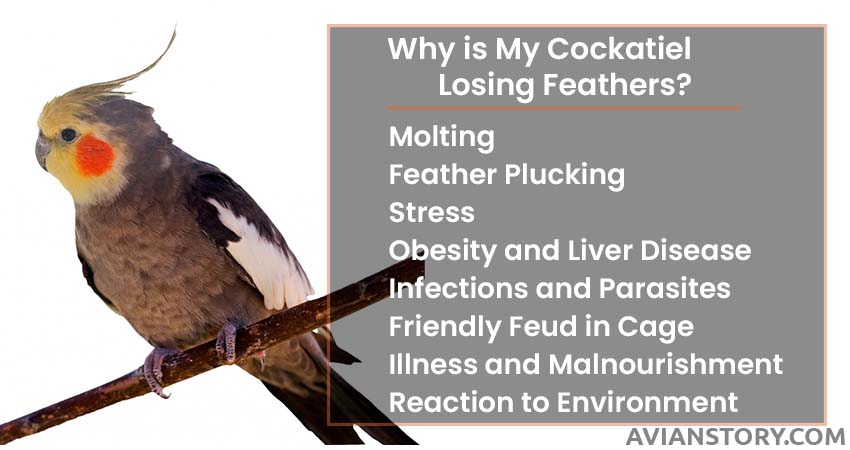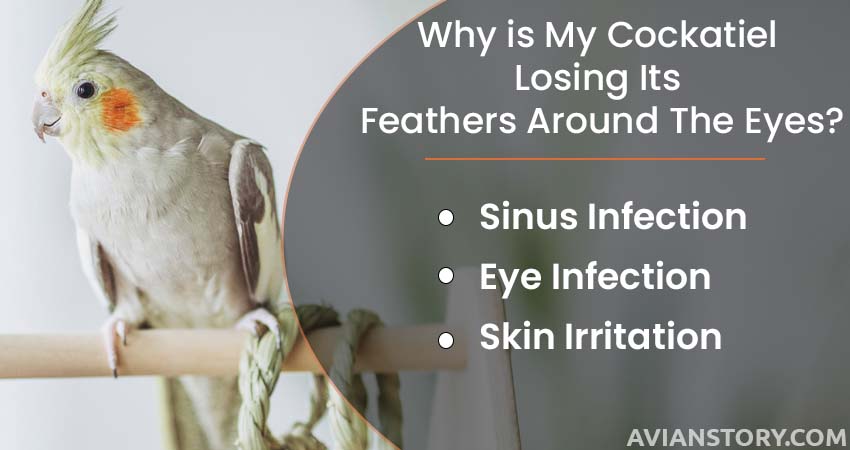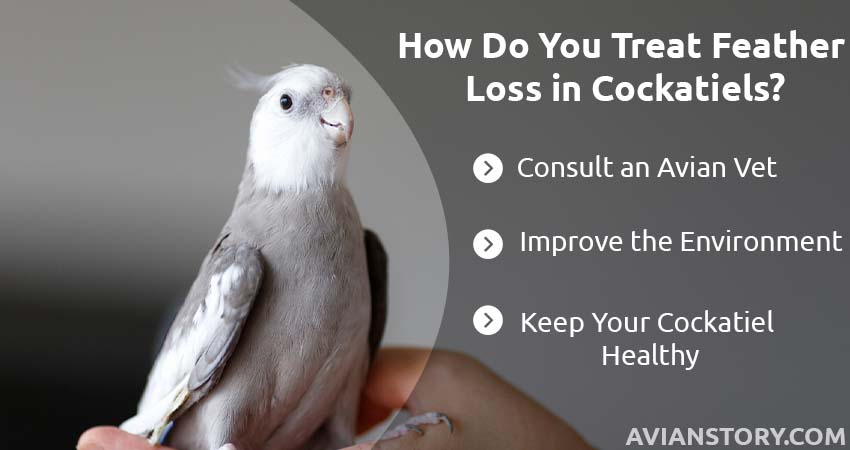Why Is My Cockatiel Losing Feathers: Should I Be Worried?
It must be frustrating to see your cockatiel’s feathers here and there in your house. But it is more frustrating not to know why it is happening to your pet. That’s why we came forward to help.
So, you may wonder, why is my cockatiel losing feathers? A cockatiel may molt, experience stress, engage in feather-destroying behavior which is also called plucking, over-cleanse itself, be exposed to the elements, or contract an infection.
That’s about it. But to know more about losing feathers in detail and how you can prevent it from happening, let’s jump right into the article without any further ado.
Why is My Cockatiel Losing Feathers?
Cockatiels are well known because of their distinctive feather color and design. Many owners find that the loss of feathers might be concerning when trying to determine why, especially as cockatiels are frequent companions and pets in homes.
What causes your cockatiel to lose feathers then? Let’s read below to find out.

Molting
The molting process is the main cause of a cockatiel’s feather loss. Although it happens occasionally, it’s natural for your cockatiel to lose some feathers.
The majority of the feathers are gradually lost throughout this two-month-long molting period as they develop new feathers.
If molting is your cockatiel’s primary reason for the feather loss problem, you will see the pin feathers on your pet. You will also see some spiky newly growing feathers in places, but it won’t be able to fix the issue.
Read Also: Why Do Cockatiels Puff Up?
Feather Plucking
Cockatiels are very social birds since they dwell in vast flocks of other birds in the wild. It might lead to serious psychological issues and mental discomfort to leave your bird alone.
So they pick at their feathers to express their annoyance. In certain instances, to the point where their plumage develops noticeable bald patches.
Stress
Stressed-out, anxious birds who self-mutilate may end up harming their hair follicles and preventing the formation of new feathers.
Although there are many possible causes of stress, one of the main factors that contribute to cockatiels plucking or over-preening their feathers is stress.
Obesity and Liver Disease
Your caged pet is prone to overweight and liver disease if you give it excessively fatty foods or if they generally acquire too much nourishment without enough exercise. The liver becomes fatty inside the cockatiel’s body.
So, if you don’t give your feathered buddy enough time to detoxify, they’ll get major health issues, and occasionally they’ll develop itchy or blistering skin conditions that can lead to plucking.
Infections and Parasites
Do not assume that a cockatiel has several feathers that will help the bird in protecting itself from parasites and skin disorders. It is nevertheless possible that your cockatiel will contract lice, fleas, or other microscopic insects, even if these instances are uncommon.
They may lose a good portion of their feathers in the process as well. Ringworm, a fungal infection can be the reason behind your cockatiels’ feathers around their head or close to their neck begin to fall out.
Likewise, the cockatiel may itch as well as scratch its body as a result of parasite and fungus infections. Besides, it is usual if your cockatiel gets so irritated that it pulls on its own feathers to speed up the process.
Friendly Feud in Cage
Sometimes, you might see a bald area on your cockatiel in an unimaginably difficult location. You are aware that the caged male bird could not have injured himself. Therefore, his woman companion, whose innocent eyes glitter at you, is to blame.
In other words, cockatiels naturally pull each other’s feathers. The females typically do it when they are prepared to mate.
Illness and Malnourishment
The skin of some tumors or lipomas may stretch taut, alter, and make the bird uncomfortable. And that may make your cockatiel tear off portions of its plumage in an effort to relieve this feeling.
However, in many instances, the skin is so stretched that the feathers lose their hold, causing the bird to lose its feathers without even tearing them.
The lutino cockatiel syndrome, which also includes a variety of other symptoms like lack of coordination, hemophilia, falling from the perch, and other aberrant signals, can also be indicated by a bald region on the head, including a substantial reduction of the crest.
Reaction to Environment
A cockatiel may start plucking or preening as a response to its surroundings. It will respond, for instance, if the heating is increasing exponentially. It might start plucking in an effort to control its body temperature.
Many cockatiels and parrots in general, benefit from the body temperature regulation that feather loss provides.
Accordingly, understanding why your partner loses feathers can be mostly determined by seeing how your cockatiel responds to its environment.
Why is My Cockatiel Losing Its Feathers Around The Eyes?
You might have noticed that your cockatiel’s eyes have feathers falling off around them. There are three potential causes for this:

- Sinus Infection: Cockatiels are susceptible to painful sinus infections, which can result in the loss of feathers.
- Eye Infection: Bacteria can also infect your cockatiel’s skin and feathers around the eye.
- Skin Irritation: To soothe skin irritation, your cockatiel can massage items on its face. However, this can harm the feathers.
In such circumstances, it is advised to request an antibiotic from your veterinarian.
How Do You Treat Feather Loss in Cockatiels?
You most likely purchased your pet cockatiel with the idea of spending time with him or her, so that much is safe to say. Then do that action. If possible, let your bird friend engage with you and your family by opening the cage.
If your cockatiel is acting out of boredom, worry, or loneliness, among other reasons, it probably just needs some time with its owner or a stimulating activity to keep it occupied.
Most cockatiels won’t automatically stop their plucking behavior. Therefore, you must investigate the cause of the cockatiels’ behavior and find a solution.

Consult an Avian Vet
When dealing with cockatiel issues, it is essential to speak with a veterinarian. S/He will assist you with the following:
- To lessen the issues.
- To determine whether feathers are falling naturally or whether they are yanked out by hand.
- To repair the harm, he will recommend medical care.
- While a dietary imbalance may be self-correctible, it is more difficult to get rid of the picking habit.
Improve the Environment
Limiting stress is the best line of action at the moment. You can draw your cockatiel’s attention toward something interesting. That will help it away from this activity by giving it different outlets for energy. This includes
- Nutrition enhancement
- Supplying fresh playthings and educational activities
- Keeping a routine
- Make your cockatiel’s habitat more comfortable by making changes
- Increase communication with them
- Cleaning the cage on a regular basis
Keep Your Cockatiel Healthy
Mostly, it is normal for cockatiels to lose feathers. But in order to grow some new feathers and feel better, they must go through this molting process.
Even if your cockatiel keeps picking at its feathers, this is unimportant. All they are doing is assisting it.
However, it is best if you consult your veterinarian if you feel there may be another cause for your cockatiel’s feather loss.
Frequently Asked Questions
If you have further queries about your cockatiel’s feather loss problem, take a look at these frequently asked questions for clarity.
What time of year does a cockatiel molt?
It only varies on the individual bird and occasionally the weather, but cockatiels begin their mature molt between 6 and 12 months of age. A molt may start when it gets warmer.
What does a molting cockatiel look like?
There will be tons of feathers and flakes lying around, and you’ll notice the bird grooming itself more frequently. Additionally, since a feather that falls out isn’t quickly replaced with a new one, it won’t look at its best.
Why is my cockatiel losing feathers on his head?
A bird’s head feather loss could indicate a few different things. It can be an atypical molt, a sign of ringworms or another parasite or infection, the excessive parent or partner grooming, or a vitamin A deficiency.
Conclusion
Well, to sum up, it is pretty normal for a cockatiel to lose some feathers, but that doesn’t mean you are not going to look into it. There are several more health conditions that can trigger such a situation.
So, even if you know your pet bird is just molting, do check other prospects that can drive your cockatiel to lose feathers. There is no room for ignorance when it comes to your beloved pet.
So, take care of your cockatiel and keep an eye on its diet and health. And if you see anything unusual, don’t delay consulting your vet and figure out the problem.
